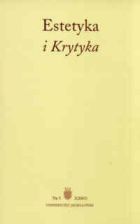ZADANIA FILOZOFII POSTNEOKANTOWSKIEJ W INTERPRETACJI JOSÉ ORTEGI Y GASSETA
THE OBJECTIVES OF POST-NEO-KANTIAN PHILOSOPHY IN JOSÉ ORTEGA Y GASSET’S THOUGHT
Author(s): Dorota LeszczynaSubject(s): Philosophy
Published by: Wydawnictwo Uniwersytetu Jagiellońskiego
Summary/Abstract: The aim of the paper is to characterize the neo-Kantian and post-neo-Kantian philosophy by José Ortega y Gasset (1883–1955). Ortega studied at the University of Marburg under the care of Hermann Cohen and Paul Natorp. He attended the lectures, together with Nicolai Hartmann, Paul Scheffer and Heinz Heimsoeth. A group of his comrades from Marburg he called “Generation 1911.” Representatives of “Generations 1911,” although formed in a closed, neo-Kantian fortress, created their own philosophical and original workshop. The characteristics of the philosophy of “Generation 1911,” Ortega presented in his work Prólogo para alemanes, pointing at the same time on the tasks and goals that can be reduced to three basics: practicing philosophy in a systematic way, the rebirth of ontological reflection and overcoming of idealism.
Journal: Estetyka i Krytyka
- Issue Year: 26/2012
- Issue No: 4
- Page Range: 51-60
- Page Count: 10
- Language: Polish

